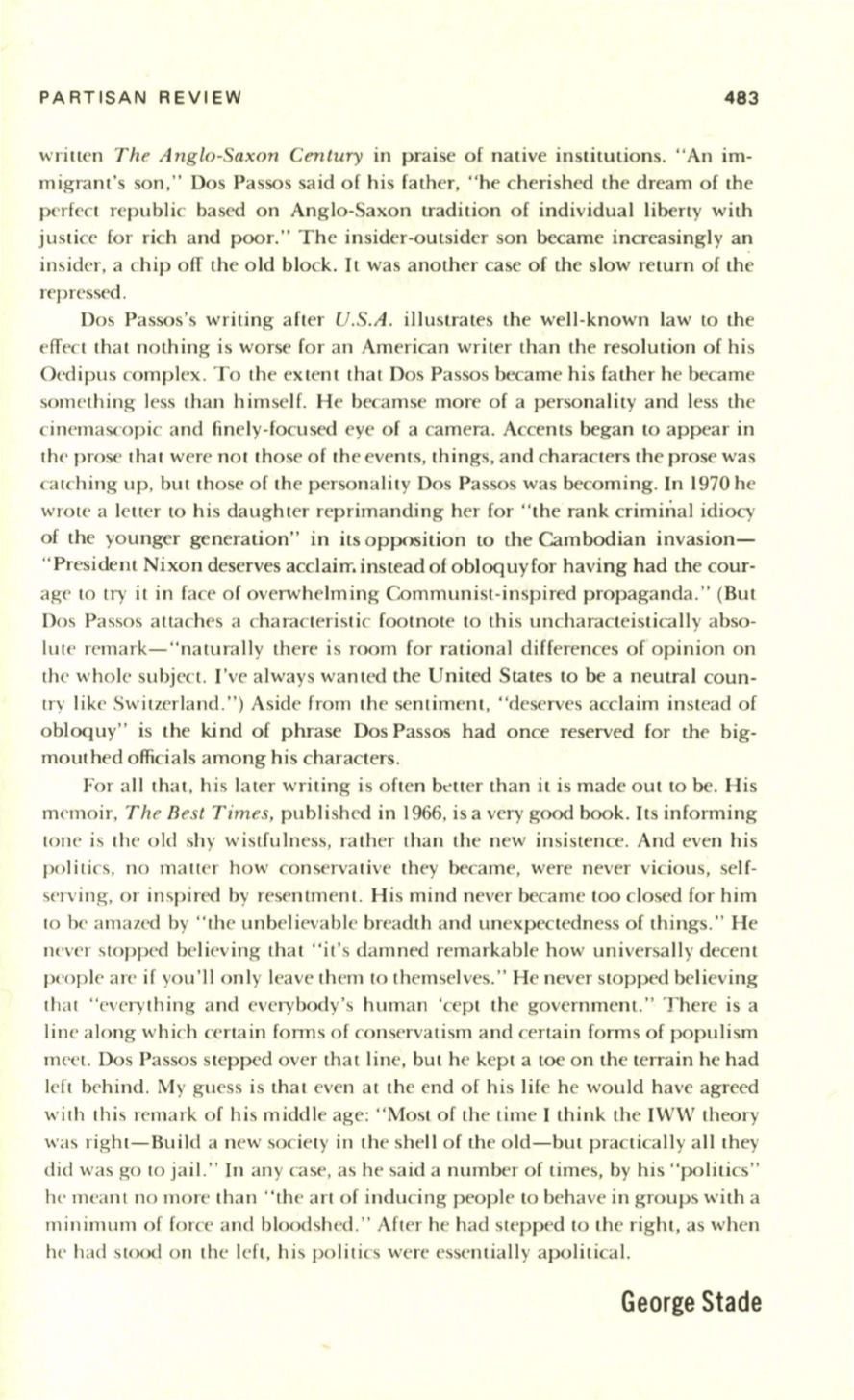
PARTISAN REV I EW
483
wriuen
Th e Anglo-Saxon Century
in praise of nalive inslilulions. "An im–
migrant's son ," Dos Passos said of his falh er, " he cherished the dream of the
perfeCl republic based on Anglo-Saxon lradilion of individual liberty wilh
juslice for rich and poor." The insider-oulsider son became increasingly an
insider, a chip off the old block. Il was anolher case of the slow return of lhe
repressed.
Dos Passos's wriling after
U.S. A.
illuslrales the well-known law LO lhe
effecl lha l nOlhing is worse for an American writer than the resolulion of his
Oedipus complex . To the eXlent lhal Dos Passos became his father he became
somelhing less lhan himself. H e becamse more of a personalilY and less lhe
cinemascopic and finely-focused eye of a camera. Accents began lO appear in
lhe prose lhal were nOlthose of th e events, lhings, and characlers the prose was
catching up, bUllhose of the personalilYDos Passos was becoming. In 1970 he
wro le a letter lO his daughler reprimanding her for "lhe rank criminal idiocy
of the you nger generation" in ils opposition to the Cambodian invasion–
" Preside nt Nixon deserves acclairr. instead of obloquy for having had the cour–
age LO lry il in face of overwhelming Communisl-inspired propaganda." (BUl
Dos Passos a llaches a characlerislic foolnole lO lhis uncha racleislica lly abso–
lut e remark-"nalurally lhere is room for ralional differences of opinion on
lhe whole subj ect. I've a lways wanted the United States LO be a neutral coun–
lry like Sw itzerla nd. ") Aside from the sentiment, "deserves acclaim instead of
obloquy" is the kind of phrase Dos Passos had once reserved for the big–
mouthed officials among his characters.
For all that, his la ter writing is often beller than it is made out to be. His
memoir,
The Best Times,
published in 1966, is a very good book. Its informing
LOne is the o ld shy wistfulness, rather than the new insistence. And even his
politics, no matter how con serva tive they became, were n ever vicious, self–
serving, or inspired by resentment. Hi s mind never became LOO closed for him
to
be amazed by " the unbelieva ble breadth and unexpectedness of things." He
never stopped believing that "i t's damned remarkable how universa lly decent
people arc if you'll only leave them LO themselves." He never SLOpped believing
th a I "everything a nd everybody 's human 'cept the government." T here is a
line a long which certa in form s o f conservat ism and certain forms of populism
meet. Dos Passos stepped over tha t line, but he kept a LOe on the terrain he had
left behind. My guess is tha t even at the end of his life he would have agreed
wilh Ihis rema rk o f hi s middle age: "Most of the time I think the IWW theory
was right-Build a new society in the shell of the old-but practica lly all they
did was go LO ja il. " In any case, as he said a number of times, by his "politics"
he meanl no more than " the art o f inducing people to behave in groups with a
minimum of force and bloodshed." After he had stepped
to
the right, as when
he had sLOod o n the left, hi s po liti cs were essentia ll y apolitica l.
George Stade


